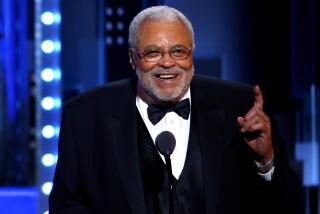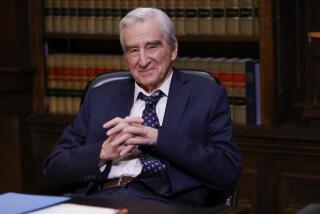Edgar Allan Jones Jr. dies at 92; law professor played judge on TV courtroom shows
- Share via
The TV career of Edgar Allan Jones Jr. began with a phone call in early 1958 from a producer who needed to cast someone knowledgeable about the law. Although Jones taught law full time at UCLA, he was nervous at the prospect of auditioning: His only acting experience had been a walk-on part in a high school production of “Julius Caesar.”
Several professional actors also vied for the job, but the role went to the amateur. Jones was cast as the judge on KABC-TV’s “Traffic Court,” one of the medium’s earliest nonfiction courtroom shows. He was such a hit that he was soon elevated to network TV as the judge on the ABC shows “Day in Court” and “Accused.”
Jones, who kept his day job at UCLA during the six years he presided over the televised mock courts, died Friday in Santa Monica after a short illness, his family said. He was 92.
Chosen for the shows because of his ability to improvise as well as for his legal expertise, Jones worked without a script, preferring the air of realism that came from letting the events unfold.
“There was no better ad libber in the television medium — and it was necessary, for the program’s authenticity, that he be accomplished in this skill,” Rick DuBrow, then a TV critic for UPI, wrote of Jones in 1964.
Jones became a star of the new genre in an era when fictional and quasi-real courtroom shows, including “Divorce Court” and “Perry Mason,” were proliferating — and decades before “The People’s Court” and “Judge Judy.”
“Traffic Court,” like the other two shows featuring “Judge” Jones, was based on actual cases argued by real lawyers. Many cases were chosen for their amusing twists, such as one involving a physics teacher who was cited for driving with his feet because he needed his hands to hold on to a kite he was using in a wind experiment.
Actors usually portrayed the defendants, witnesses and courtroom staff, although Dodgers pitcher Sandy Koufax once appeared as himself after receiving a ticket for stopping his car when it was struck by a baseball from a Little League game.
Jones told the Metropolitan News-Enterprise in 2003 that the show sought cases that were unusual but still believable enough that viewers would think, “That could have happened to me, or that did happen to me.”
Born in New York City on Jan. 8, 1921, Jones grew up in Asbury Park, N.J. He graduated from Wesleyan College in 1941 and joined the Marines, serving in the Pacific during World War II.
After the war, he earned a law degree from the University of Virginia in 1950 and joined the UCLA law school faculty in 1951. He taught torts, labor law and labor arbitration until his retirement in 1991.
With a family that eventually grew to 11 children, Jones was attracted to the income the TV shows provided.
In addition to his children, Jones is survived by his wife of 68 years, Helen; 23 grandchildren; and five great-grandchildren.
He appeared on “Traffic Court” from June 1958 to March 1959, taking over from then-Municipal Court Judge Evelle J. Younger, who would later become California attorney general.
His second show, “Day in Court,” was launched in 1958 and lasted longer than its prime-time spinoff, “Accused,” but it “caused a lot of consternation among the bar. In those days they thought a show like that was making the law mundane and show-biz,” said Bill Gould, a Century City attorney who as one of Jones’ students had helped research cases used on the program.
“But professor Jones never did anything inappropriate. He handled the show with distinction. It was a much more dignified show than Judge Judy and those other shows.”
By 1964, “Day in Court” was daytime TV’s top-ranked show, with 20 million viewers. But when it slipped to second behind the daytime soap “General Hospital,” ABC decided to turn its courtroom hit into a soap opera. Jones quit, leading UPI’s DuBrow to lament that television had lost “a remarkable performer.” The show went off the air several months later.
Jones said he found that playing a television judge was not that different from being a law professor. The Socratic method helped him in both jobs, and law students, like live TV, were “full of surprises. And, of course,” he told The Times in 1959, “most law professors are hams!”
More to Read
Start your day right
Sign up for Essential California for the L.A. Times biggest news, features and recommendations in your inbox six days a week.
You may occasionally receive promotional content from the Los Angeles Times.







